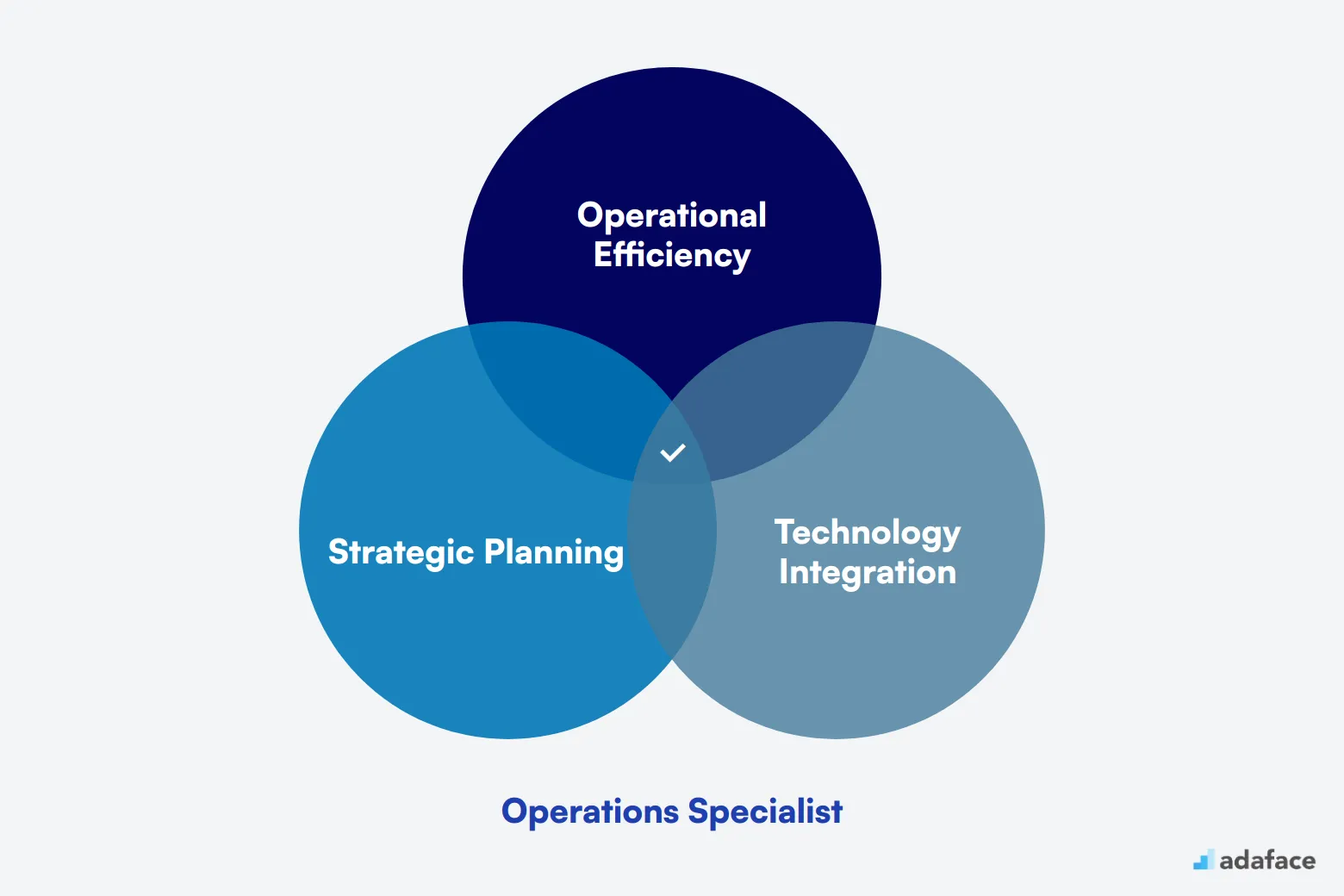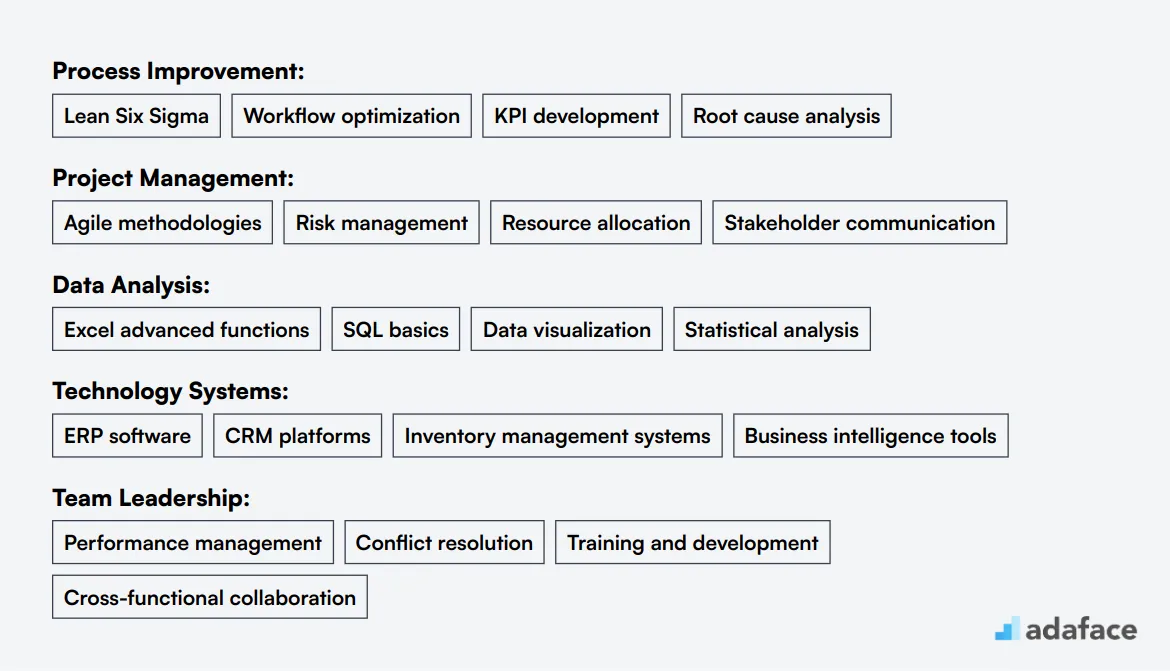Hiring an Operations Specialist is a critical responsibility for recruiters and hiring managers, as this role directly impacts the efficiency and productivity of an organization. Many companies often overlook the importance of strategic planning and thorough screening processes when seeking candidates for this position. Operations Specialists ensure smooth business processes and collaboration across departments, so it's imperative to choose candidates with a proven track record of adaptability, strategic thinking, and exceptional organizational skills.
In this article, we'll guide you through everything you need to know about hiring an Operations Specialist. From understanding their role and responsibilities to identifying key skills and qualifications, we've got you covered. Additionally, we'll explore resources like interview questions to help you evaluate potential hires effectively.
Table of contents
Why Hire an Operations Specialist?
An Operations Specialist can help streamline your business processes and boost efficiency. Start by identifying operational bottlenecks or areas where your company is struggling to meet targets. For example, you might need help optimizing inventory management or improving customer service response times.
Consider hiring an Operations Specialist if you're facing challenges like:
- Inconsistent quality control
- Inefficient resource allocation
- Lack of standardized procedures
Before committing to a full-time hire, assess whether your operational issues are ongoing or temporary. If the problems are persistent and complex, bringing on a dedicated Operations Specialist might be the best solution. For short-term needs, consider working with a consultant to address specific issues.

What does an Operations Specialist do?
An Operations Specialist focuses on ensuring that business operations run smoothly and efficiently. They play a key role in managing daily activities, optimizing processes, and supporting various departments to enhance productivity.
Day-to-day tasks of an Operations Specialist may include:
- Coordinating and overseeing daily operations to ensure smooth business functions.
- Analyzing workflow processes to identify areas for improvement.
- Collaborating with different departments to enhance operational efficiency.
- Managing inventory and resources to support business needs.
- Regularly communicating with stakeholders to align operations with company goals.
For a detailed job description of this role, refer here.
Identifying Key Skills and Qualifications for an Operations Specialist
Hiring an Operations Specialist requires a clear understanding of the skills and qualifications that align with your organization's needs. One common mistake recruiters make is confusing required skills with those that are merely preferred, leading to potential mismatches in candidate selection.
To create a solid candidate profile, it’s crucial to differentiate between what is mandatory versus what can enhance a candidate’s application. Below are the essential and desirable skills and qualifications to consider for this role.
| Required skills and qualifications | Preferred skills and qualifications |
|---|---|
| Bachelor's degree in Business Administration or related field | Master's degree in Business Administration or Operations Management |
| 3+ years of experience in operations or project management | Six Sigma or PMP certification |
| Proficiency in Microsoft Office Suite and project management software | Experience with ERP systems and data analysis tools |
| Strong analytical and problem-solving skills | Knowledge of lean management principles |
| Excellent communication and interpersonal abilities | Multilingual capabilities |
How to write an Operations Specialist job description?
Writing a clear and compelling Operations Specialist job description is key to attracting the right candidates. Start by outlining the main responsibilities and how they contribute to your organization's success. Highlight tasks such as optimizing operational processes, managing cross-functional projects, and ensuring compliance with industry standards. You can find a detailed Operations Specialist job description for reference.
Balance the technical skills and certifications necessary for the role, such as proficiency in operational software or project management frameworks, with soft skills like leadership, problem-solving, and adaptability. This ensures you attract candidates who are not only technically capable but also able to thrive in a dynamic environment.
Emphasize what makes your company and the role unique. Whether it's career advancement opportunities, a supportive company culture, or involvement in innovative projects, showcasing these aspects can set your job listing apart and appeal to top-tier talent.
10 Platforms to Hire Operations Specialists
Once you have a well-crafted job description, the next step is to list your opening on job platforms to attract qualified candidates for the operations specialist role. Selecting the right platforms to post your job ensures you reach a diverse range of applicants with the skills and experience you need.
Indeed
A popular site for listing full-time operations specialist positions due to its extensive reach and user-friendly application process.

Ideal for leveraging professional networks and connections to find qualified operations specialists for any type of employment.

FlexJobs
Best for sourcing candidates interested in remote operations specialist roles due to its focus on flexible and remote work.

In addition to platforms like Indeed, LinkedIn, and FlexJobs, consider exploring Upwork if you're open to hiring freelance operations specialists. Glassdoor provides valuable insights into candidate expectations through reviews and salary data, while AngelList connects you with talent interested in startups. For broader reach, Monster and CareerBuilder are helpful for full-time roles. If remote talent is your focus, Remote.co is a strong choice. SimplyHired offers a user-friendly option for part-time roles. To streamline your recruitment process, consider using an online assessment platform to evaluate candidate skills effectively.
Keywords to Look for in Operations Specialist Resumes
Resume screening is a key step in finding the right Operations Specialist. It helps you quickly identify candidates with the most relevant skills and experience before moving to interviews.

When manually screening resumes, focus on key terms like 'process improvement', 'project management', and 'data analysis'. Look for specific tools like Microsoft Office Suite, ERP systems, and project management software. This approach narrows down your candidate pool efficiently.
Alternatively, use AI tools like ChatGPT to automate resume screening. Provide the AI with a list of required skills and qualifications, and let it analyze resumes to identify top candidates. This can save time and ensure consistent evaluation.
Here's a sample prompt for AI-powered resume screening:
TASK: Screen resumes for Operations Specialist role
INPUT: Resumes
OUTPUT:
- Candidate name and email
- Matching keywords
- Score (out of 10)
- Shortlist recommendation (Yes/No/Maybe)
KEYWORDS:
- Process improvement (Lean Six Sigma, workflow optimization)
- Project management (Agile, risk management)
- Data analysis (Excel, SQL basics)
- ERP systems
- Team leadership
Customize this prompt based on your specific job requirements for best results.
Which skills tests should you use to assess Operations Specialists?
To ensure you hire the best Operations Specialist, using skills tests is a smart approach. These tests help gauge a candidate's abilities in real-world scenarios beyond just resume credentials.
Attention to Detail Test: Operations Specialists must pay meticulous attention to detail to avoid costly mistakes. This test helps evaluate their ability to notice and correct errors effectively.
Problem Solving Test: The ability to solve problems is crucial for Operations Specialists, as unexpected issues often arise. This assessment measures their logical thinking and problem-solving abilities.
Communication Test: Clear communication is key in operations roles. With the Communication Test, you can assess a candidate’s proficiency in conveying ideas and instructions.
Project Management Test: Operations Specialists often juggle multiple tasks and projects. A Project Management Test will help identify candidates who can manage projects efficiently and meet deadlines.
Administrative Assistant Test: This test evaluates organizational skills, which are central to the role of an Operations Specialist. It helps you identify candidates who can handle administrative tasks with precision.
Case study assignments for hiring Operations Specialists
Case study assignments are a great tool to evaluate potential Operations Specialists. While they provide deeper insights into a candidate’s skills, they can also be time-consuming, resulting in lower test-taking rates and potentially losing strong candidates. Let's explore some sample case studies that can help in selecting the right candidates.
Supply Chain Optimization is a case study where candidates are asked to analyze and improve a supply chain process. This helps assess their analytical skills and their ability to streamline operations. You can explore relevant skills assessment tools for further evaluation.
Process Improvement Proposal involves candidates crafting a proposal to enhance an existing business operation. This showcases their problem-solving abilities and their knack for identifying opportunities for improvement. For more insights, refer to our article on problem-solving interview questions.
Resource Allocation Challenge tests a candidate's ability to allocate resources effectively under constraints. It's recommended for assessing their decision-making skills and prioritization abilities, key traits for an Operations Specialist.
Structuring the Interview Stage for Operations Specialist Candidates
After candidates pass the initial skills tests, it's time for technical interviews to assess their hard skills in depth. While skills tests are great for initial screening, technical interviews help identify the best-fit candidates for the Operations Specialist role. Let's look at some sample interview questions to evaluate candidates effectively.
Consider asking questions like: 'How do you prioritize tasks when managing multiple projects?', 'Describe a time when you improved an operational process', 'How do you handle conflicts between team members?', 'What metrics do you use to measure operational efficiency?', and 'How do you stay updated on industry trends and best practices?'. These questions help assess a candidate's problem-solving skills, process improvement abilities, conflict resolution tactics, analytical thinking, and commitment to professional growth.
What's the difference between an Operations Specialist and an Operations Manager?
Although the roles of Operations Specialist and Operations Manager may appear similar at first glance, they serve different functions within an organization. The confusion often arises because both are involved in operational processes but operate at distinct levels of responsibility and authority.
An Operations Specialist typically executes daily operations, focusing on process improvement and data analysis. They usually require 1-3 years of experience and have limited decision-making authority, often reporting to the Operations Manager. In contrast, an Operations Manager oversees the entire operations department, making strategic decisions and managing a team of specialists, requiring 5+ years of experience and potentially a Master's degree. Their focus areas include budgeting and performance management, reflecting their higher level of responsibility.
| Operations Specialist | Operations Manager | |
|---|---|---|
| Level of responsibility | Executes daily operations | Oversees entire operations department |
| Decision-making authority | Limited to specific tasks | Strategic decisions for operations |
| Experience required | 1-3 years | 5+ years |
| Team management | No direct reports | Manages team of specialists |
| Education level | Bachelor's degree | Bachelor's or Master's degree |
| Focus areas | Process improvement, data analysis | Strategy, budgeting, performance management |
| Salary range | Lower to mid-range | Mid to upper range |
| Reporting to | Operations Manager | Director or C-level executive |
What are the ranks of Operations Specialists?
Operations Specialists can have various ranks depending on their experience, skills, and the organization's structure. Understanding these ranks helps in creating a clear career path and setting appropriate expectations for both employers and employees.
- Junior Operations Specialist: This entry-level position is for those new to the field. They handle basic operational tasks, assist senior team members, and learn the ropes of the organization's processes.
- Operations Specialist: The standard role involves managing day-to-day operations, implementing process improvements, and collaborating with different departments. They often have a few years of experience under their belt.
- Senior Operations Specialist: With substantial experience, these professionals take on more complex projects, mentor junior staff, and contribute to strategic planning. They may also lead small teams or specific operational areas.
- Operations Manager: This role oversees multiple operational functions and teams. They're responsible for setting goals, managing budgets, and ensuring operational excellence across the organization.
- Director of Operations: At this level, professionals are part of the senior leadership team. They develop long-term operational strategies, manage large teams, and directly impact the company's overall performance.
- Chief Operations Officer (COO): The highest rank in operations, the COO is responsible for all operational aspects of the company. They work closely with the CEO to drive the organization's growth and efficiency.
When hiring for these positions, it's crucial to ask the right operations specialist interview questions to ensure candidates have the skills and experience required for each rank.
Hire the Best Operations Specialists
We've covered the role of Operations Specialists, key skills, job descriptions, hiring platforms, resume keywords, and assessment methods. Understanding these aspects helps create a solid foundation for your hiring process.
The key takeaway is to use well-crafted job descriptions and appropriate skills tests to make your hiring accurate. Consider using an attention to detail test or a problem-solving test to evaluate candidates objectively. By combining these tools with structured interviews, you'll be well-equipped to find the right Operations Specialist for your team.
Attention To Detail Test
FAQs
An Operations Specialist is responsible for ensuring smooth and efficient business operations by coordinating between different departments, optimizing processes, and implementing strategic initiatives.
Key skills for an Operations Specialist include excellent organizational abilities, problem-solving, strategic thinking, strong communication, and the ability to adapt to changing environments.
You can assess the skills of an Operations Specialist candidate through a combination of interviews and skills assessments. Consider using tests from platforms like Adaface for a thorough evaluation.
You can find qualified Operations Specialists on professional networking sites, job boards, recruitment agencies, and specialized platforms that connect job seekers with employers.
An Operations Specialist focuses on specific projects and tasks to optimize processes, while an Operations Manager oversees broader operations and team management.
An Operations Specialist job description should include a summary of the role, key responsibilities, required skills, qualifications, and any specific industry knowledge needed. For more details, refer to this job description template.
Structure the interview process by including behavioral and situational questions, skills assessments, and case study assignments to gauge a candidate's proficiency in relevant areas.

40 min skill tests.
No trick questions.
Accurate shortlisting.
We make it easy for you to find the best candidates in your pipeline with a 40 min skills test.
Try for freeRelated posts
Free resources



